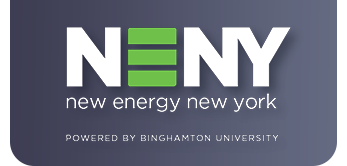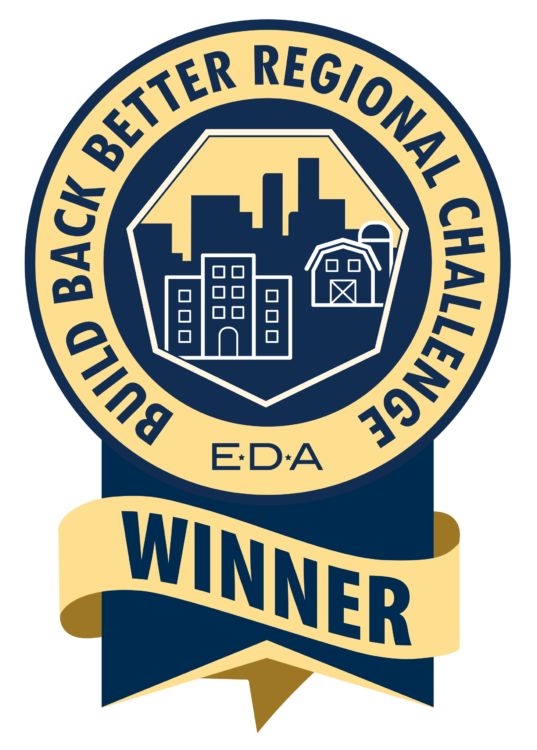
ChargeUp Accelerator kicks off second cohort in Binghamton
By Katie Liu, April 24, 2025
Leaders from seven visionary battery and energy storage-focused companies arrived in Binghamton last week to kick off ChargeUp Accelerator’s seven-month program. The week included curriculum, company pitches and exclusive tours of cutting-edge facilities at Binghamton University.
ChargeUp, powered by New Energy New York (NENY) through a National Science Foundation innovation grant, is currently the first and only accelerator program in the U.S. to solely focus on supporting battery startups. Rooted in upstate New York’s growing battery industry, it aims to push companies into investment-ready shape, through a combination of rigorous online learning, paired with monthly in-person sessions.
This year’s cohort expands upon last year’s: From innovating new environmentally friendly cathodes with non-toxic chemistry, to developing lithium-sulfur chemistries that can be used in aerospace industries, to diagnostic technology that can discern EV battery cell and pack health in just two minutes, these entrepreneurs are taking the chance to venture toward a cleaner future — in their own ways, all together.
The cohort began the week with pitches to one another and ChargeUp board members, tours of the Koffman Southern Tier Incubator where they worked, and a guest lecture from lithium-ion battery inventor and Nobel laureate M. Stanley Whittingham.
“It is so wonderful to see him in person,” said Subathra Rajendran, CTO of Coulomb Technology, which creates batteries using earth-abundant materials like sodium and zinc. “I have gone through his lectures and papers, but it really makes a difference to meet him and get inspiration here, and to see fellow battery companies.”
The cohort also had an exclusive tour of the Northeast Center for Chemical Energy Storage (NECCES), Whittingham’s lab on the Binghamton campus. There, they could peek into the state-of-the-art NECCES dry room, as well as explore facilities like the Analytical & Diagnostics Laboratory (ADL) — all open-user facilities offering the potential for future collaboration based in Binghamton.
“In terms of batteries, the ecosystem that’s been built in upstate New York is unmatched anywhere else in the country or even the world,” said Christopher Schauerman, CEO of Cellec Technologies, which aims to refine zero-volt stability in lithium-ion cell cells.
“Being able to access everything that New York state has to offer is really critical for a business as young as us. So we’re really excited that we’re getting plugged into this type of ecosystem,” said Derrick Maxwell, CEO of Amel Energy, whose mission is to replace toxic solvents and forever chemicals from lithium-ion batteries. Amel Energy, one of the smallest teams in the cohort, also recently won an R&D grant under the NSF Energy Storage Engine in Upstate New York.
On top of exploring the industry’s collection of leading-edge facilities, the cohort underwent assessments to pinpoint areas where ChargeUp mentors could further guide and support them. Cohort members could also hear from industry veterans throughout the week about critical skills, such as customer discovery and financial modeling.
“This type of cohort program and session is a good opportunity for us to learn how to move our company from zero to the most peak level,” said Sajibul Bhuyan, head of R&D at the lithium-sulfur battery startup Valgotech.
While much of the ChargeUp curriculum takes place virtually, intensive week-long sessions each month bring the cohort together from around the country to network and learn together, and from each other.
“I learn a lot better in-person,” Schauerman said. “Being able to talk to people and share experiences, you really form deeper connections with other cohort members and mentors, and have access to various resources that are presented in-person that cannot be replicated virtually.”
A few cohort members had participated in other accelerator programs previously, but entrepreneurs like Rajendran and Dave Berlin of vsNew — which offers an EV battery health testing system — said they found ChargeUp particularly advantageous for its focus on batteries.
“We come at it from a little different perspective than most of the companies that are here,” Berlin said, “so I think the diversity will be good. We’re looking forward to learning more about the future of EV batteries, which will be important for us to understand.”
LiBama Power, which specializes in removing the needle-like lithium dendrites that can build up in batteries as they charge, is another company that comes with previous experience as a member company of the Koffman Incubator.
“This region is most notable for the battery ecosystem,” said Wentao Li, founder and CTO of LiBama Power. “We have benefited hugely from the New Energy New York and NSF Engine programs, including internships and funding.”
Each company is at a unique yet pivotal stage in their journey — but one thing these enterprising leaders share is their hope to grow both personally and on behalf of their companies.
“At the end of the program, we hope to have enough business acumen that people can see us beyond our chemical engineering PhDs, and really see that we can successfully run a business,” said Alyssa Stavola, COO of Amel Energy.
Looking forward, these startups will be keeping busy with ChargeUp homework as well as their own goals and company timelines. Amel Energy will be targeting customer discovery and manufacturability; Valgotech is aiming to begin pilot manufacturing and see their prototypes start to power drones; companies like FastLion Energy, which aims to drastically speed up and improve charging capabilities, are seeking customer feedback to refine its technology.
“ChargeUp has a lot of not just very experienced people, but good people — people who are here to actually help make a difference in the world and help new companies succeed,” said FastLion Energy CTO Brian McCarthy. “They really care passionately about that, revitalizing the area, bringing jobs, and the Koffman Incubator itself is a great place and making it very easy for companies to come work here, grow and get a foothold. I’m very grateful to all of them.”
The ChargeUp cohort will meet again in Rochester, N.Y. next month for more lessons and battery seminars, immersed in the rich history and potential of New York’s energy ecosystem while aiming to make history themselves.
“New York state loves batteries as much as we love batteries!” Stavola said.
.





